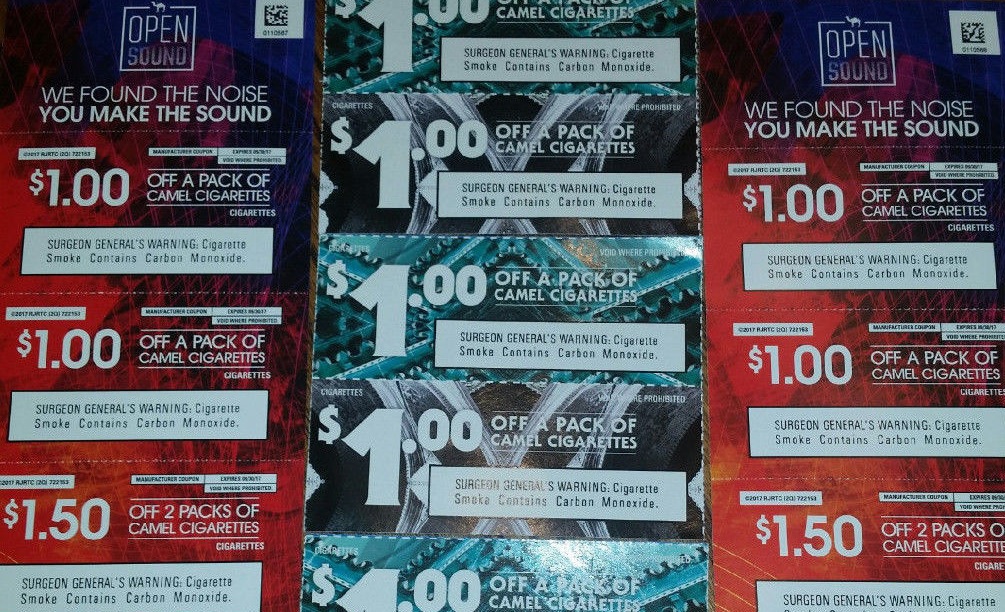The whole idea of coupons is to get you to try a new product, or buy more of something you otherwise might not.
So, it stands to reason, coupons for cigarettes can drive you to smoke!
That’s according to the authors of a new study, who found that nonsmokers who received cigarette coupons were more likely to start smoking, and current smokers who received coupons were more likely to continue smoking.
And that has some anti-tobacco advocates calling for new restrictions, ensuring that tobacco coupons are only sent to people who already smoke.
The study “Receipt of Tobacco Direct Mail Coupons and Changes in Smoking Status in a Nationally Representative Sample of U.S. Adults” was published in a recent edition of the academic journal Nicotine & Tobacco Research. Its authors found that 36.2% of smokers – and 12.4% of nonsmokers – reported receiving tobacco coupons through direct mail or e-mail.
That amounts to about 17 million smokers and more than 21 million nonsmokers – which means nonsmokers are actually receiving more coupons for cigarettes than those who regularly buy them.
And those coupons are apparently helping to turn some nonsmokers into smokers. Previous surveys have shown that the high cost of smoking is frequently cited as a reason smokers would like to quit, and nonsmokers would prefer not to start. So tobacco companies are looking for ways to make their prices more attractive. According to Federal Trade Commission figures cited in the study, price discounts, coupons and direct mail marketing comprised 86% – or $567 million dollars’ worth – of the industry’s total cigarette advertising and promotion expenditures in 2014.
That’s because those investments are apparently paying off. The study found that occasional smokers who received coupons were 70% more likely to progress to daily smoking than those who did not receive coupons. And nonsmokers who received cigarette coupons were 76% more likely to become smokers than nonsmokers who did not receive coupons.
So are nonsmokers getting cigarette coupons by mistake – or is something more sinister going on?
The study suggests that the tobacco companies know exactly who they’re sending their coupons to. The researchers found that not only were nonsmokers receiving coupons, but female smokers were more likely than males to receive direct mail coupons, which “may be due in part to women being more likely than men to use coupons generally,” the study noted. And individuals with lower incomes and lower education levels, regardless of their smoking status, were also more likely to report receiving cigarette coupons. “This corroborates tobacco industry documents indicating tobacco companies are targeting these populations when promoting their products,” the study found.
So the tobacco industry is well aware of what the grocery industry already knows – coupons work. Coupons encourage current customers to buy more, and noncustomers to give a product a try. But anti-smoking advocates want to draw the line at coupons for cigarettes.
“Given the enormous harms caused by smoking, including premature death, can it possibly be ethical or morally appropriate for a business to deliver discount coupons or other cigarette advertising or promotions directly to nonsmokers?” asks Eric Lindblom, the director of Tobacco Control and Food & Drug Law at the O’Neill Institute for National and Global Health Law at Georgetown University.
In an article recently posted on the O’Neill Institute’s website, Lindblom says the U.S. Food & Drug Administration needs to step in. “Is there any public health, ethical, or legal justification for the agency’s failure to prohibit businesses from delivering cigarette coupons or other advertising directly to nonsmokers?” he asks. Because the tobacco companies, he argues, won’t stop unless they’re forced to. “It would be relatively easy for cigarette companies to confirm, before making any delivery, that any planned recipient of its coupons or direct-to-consumer advertising was not just an adult but also a self-confirmed current smoker. Given their primary goal of maximizing profits, however, it is unlikely, that the tobacco companies will do that on their own, despite all the ethical, moral, and public health reasons that they should.”
As the cost of cigarettes continues to rise, largely due to increased taxes aimed at discouraging their sale, cigarette companies are relying more and more on coupons to help offset the tax hikes and keep their products affordable.
That’s led to efforts to ban the redemption of cigarette coupons altogether. In 2014, New York City passed a law setting a minimum price for tobacco products, prohibiting retailers from accepting coupons or offering any promotion that would lower the price below the established minimum. Just this week, as part of a new smoking crackdown, New York boosted that minimum price from $10.50 to $13. And it’s banning pharmacies like Walgreens and Rite Aid from selling tobacco once their current licenses expire (CVS stopped selling tobacco products in 2014).
Anti-smoking advocates are cheering moves like those in New York. But others worry it’s a slippery slope. Already, some cities are hiking taxes on sugary sodas, in part to help discourage their consumption. Could banning coupons for soda – or ensuring that soda coupons are not made available to non-soda drinkers – be next? What about banning coupons for anything that’s not considered good for you?
Most health advocates would argue that tobacco is in a class by itself, and anything to discourage people from starting to smoke is worth it. According to the Centers for Disease Control, cigarette smoking is directly responsible for more than 480,000 deaths per year in the United States. So coupons may work – but in the case of tobacco coupons, they might just work too well.















That’s what happened to me. I got 2 coupons for American Spirit cigarettes. Since they have no additives and I had always been curious about what smoking felt like, but was too embarrassed to smoke, I used them. I never realized the power of addiction (finding out years later the American Spirit cigarettes are the highest of all of them in “crack” nicotine).
Once I was over the initial difficulty (about 6 cigarettes) I grew to enjoy them by the time I was done with the 2nd pack. So I’d only very occasionally buy them and smoke on my patio, away from any prying eyes and outside so the odor wouldn’t become a part of my home.
It’s been over 5 years and I now smoke in the open. It got to the point where I couldn’t “deprive” myself any longer and the smoking gradually increased until it leveled off at around 1 pack every day.
The article is spot on.
Seriously??? It must’ve been a slow news day in the world of couponing to dream this theory up.
A $1 or $1.50 coupon will NOT get people to start smoking when the price of a pack of cigarettes in places like NY where the price of a pack is going up to $10.50.
Unless, of course, one is a complete and total moron. Or a lemming…
The coupons shown aren’t necessarily the ones referenced in the study – the study didn’t (and probably should have) specified the value of the coupons sent to consumers. They may very well have been “free” coupons.
But this is the theory they came up with, CITN is just the messenger. Slow news day in the world of couponing? Yup.